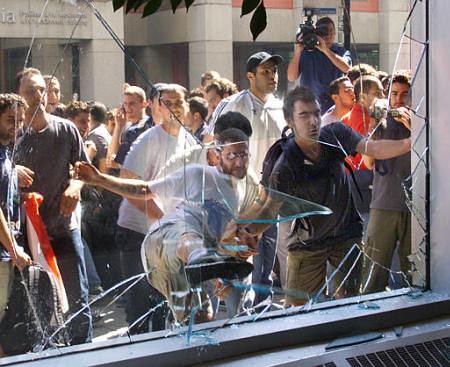
A (for Concordia students) B+ (for everyone else)
Directed by Ben Addelman and Samir Mallal
A fascinating retelling of the Netanyahu riots at Concordia University in 2002, Ben Addelman and Samir Mallal's "Discordia" casts a passionate eye on contemporary student activism as well as the rifts caused by the Israeli-Palestinian conflict on North American campuses.
In the summer of 2002, Jewish student group Hillel invited former Israeli Prime Minister Benjami Netanyahu to speak at Concordia University, a Montreal institution with a large and very vocal arab student population. After getting wind of Netanyahu's visit, a number of pro-Palestinian students gathered around Concordia's Hall building in an effort to stop Netanyahu from speaking. The resulting confrontation with Montreal's riot police squads resulted in the arrests of a number of students, the cancellation of Netanyahu's speech, and grabbed headlines around the world, from CNN to Al Jazeera. The aftermath of the incident vaulted a number of student activists to local and international of media attention, among them Solidarity for Palestinian Human Rights VP Samer Elatrash and Concordia Student Union VP Aaron Maté. These two students, as well as Noah Sarna, the president of Hillel Concordia at the time, are the primary focus of Addelman and Mallal's film and provide a riveting portrait of the misunderstandings and often bitter animosity that can characterize campus politics with regards to the Israeli-Palestinian conflict at Concordia.
Although I was not yet a student at Concordia at the time of the Netanyahu riots, I still remember the incident quite well. It caused a media uproar in Montreal and had significant reprcussion for many of the students involved. Although Netanyahu's 2002 tour of North American campuses had been met with protest at several other universities, most notably Berkeley and Northwestern, the tension his visit to Concordia caused was completley unique for the simple reason that unlike schools like Berkeley and Northwestern, who have large swaths of pro-Palestinian students but few of whom are actually Arab or Palestinian, Concordia had at the time (and still does) a huge Arab population that included a number of Palestinian students, some of whom had relatives or family members suffer directly due to Netanyahu's intrasigence while in office. As such, the suituation was much more explosive and volatile, something that is readily obvious during the first few minutes of "Discordia."
The biggest issue raised by "Discordia" is the place of free speech on college campuses and where the line should be drawn when it comes to allowing different groups to voice their opinions. Although Hillel (and Maté) invoked Netanyahu's right to free speech in arguing for him to be allowed to speak on campus, the wisdom of inviting a man directly responsible for the deaths of thousands of Palestinians to speak on a campus where the families of some of his victims studied was at best inconsiderate and at worst open provocation. The film captures Noah Sarna, who spends most of the film looking into the camera wide eyed claiming that he doesnt understand the university's anti-semitism, shouting to those who had come to see Netanyahu that the very presence of Netanyahu in "the viper's nest" of Concordia is a victory for Hillel and Israel, a statement which shows that Sarna and other members of Hillel knew full well what they were doing.
On the flip side, the CSU's decision to ban Hillel from campus following their 'recruitment' attempts for the IDF (another unsavory decision by Hillel) was highly suspect and led to considerable backlash against the CSU and the school. Mallal and Adelman do a good job of honestly showing the mistakes of both the CSU and Hillel in the wake of the incident and the decision of the CSU to simply block out Hillel from campus politics is shown as an unequivocally poor choice.
As a political film "Discordia" also quite riveting especially for those who have knowledge of subsequent CSU politics at Concordia. After turning off most of the electorate by banning Hillel, the CSU supported left leaning "Clean Slate" in the 2003 CSU elections only to see their chosen slate defeated by Hillel supported "Evolution, Not Revolution." The triumph of "Evolution, Not Revolution" slate gave a number of Hillel affiliated nuisances such as Steve Rosenshein a viable platform to push through their agendas at Concordia and further marginalized the pro-Palestinian students who consequently began working mostly through SPHR and Tadamon! to get their voice heard as opposed to ever working with the CSU again. Six years later the result has been a nepotistic CSU executive that has lost all credibility in the eyes of the students and fosters no real dialogue with SPHR or other pro-Palestinian groups on campus.
Addelman and Mallal's documentary is an interesting experience for any viewer interested in student activism or questions of free speech in North American universities but "Discordia" is most rewarding for individuals who actually have some knowledge of politics and activism at Concordia. The consequences of the Netanyahu riots are still readily obvious at Concordia and watching the events unfold on film is an especially riveting experience for Concordians.











